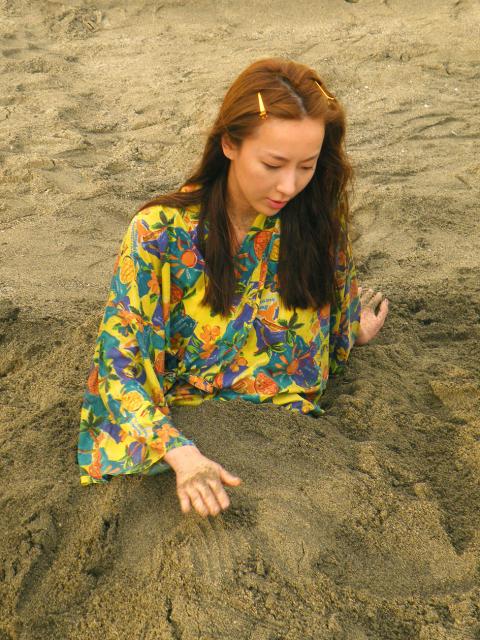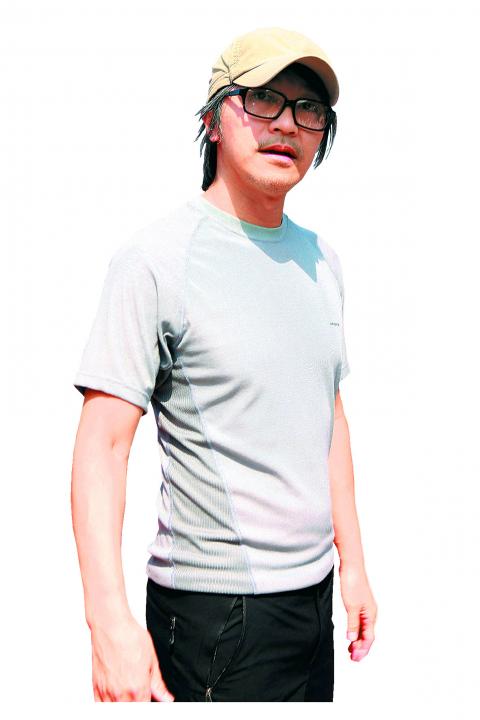The newest iPhone is going to be announced next week, which for one Taiwanese entertainer, has meant the perfect opportunity for shameless self-promotion.
Jimmy Lin (林志穎), a B-list singer/actor/tech entrepreneur who’s big in China (isn’t everyone these days?), has been in the news for tweeting a snapshot of himself tapping and swiping what he claimed to be an unreleased model of the iPhone 5.
Along with the photo, Lin wrote that he was “confirming” the rumors that the latest version of Apple’s smartphone was going to be longer but thinner and would have a bigger, 4-inch screen.

Photo: Taipei Times
Lin’s post on Weibo (微博), China’s version of Twitter, won’t be anything new to rabid Apple fans who constantly monitor the industry rumor mill for tantalizing clues about the next version of the Jesus phone. Still, his post proved link-bait worthy, scoring almost 190,000 hits.
The ever-reliable Apple Daily got on the case, quoting an Apple spokesperson who said that Lin’s purported model was “absolutely not real.” The paper provided Lin’s track record on past predictions, which included a posted photograph of himself holding a “mini-iPad” in 2010 — a product that has yet to materialize.
Lin took back his comments with a follow-up tweet, saying that he never meant to claim the phone was real and the unit he held in the photo was a mock-up sample from a parts manufacturer in China. He also told an interviewer on a Chinese television show, “This is definitely not self-promotion — I don’t need to do this kind of thing. I didn’t receive any fees to promote a company, I was just sharing some information.”

Photo: Taipei Times
In any case, Lin probably shouldn’t expect an offer to star in a future Apple commercial anytime soon.
Taiwan’s latest home-grown box office hit is The Fierce Wife: Woman Onerous, Seeking Mr Right (犀利人妻最終回: 幸福男,不難). This big screen spin-off of a popular TV soap opera raked in a very respectable NT$130 million in ticket sales, but the celebrations have been tepid.
The cast and crew, which includes heartthrobs James Wen (溫昇豪) and Sonia Sui (隋棠), held a press event to celebrate breaking the NT$100 million mark, but the media in attendance were more preoccupied with the fact that the proceedings seemed unusually dispirited and “low-key,” and the cast did not come across as properly “sincere.”
One reason, the Apple Daily suggested, was the film’s unfavorable critical reception. Common gripes included the “crude” product placement in the film and the low-production values — the movie looked more like a television show than a film. This was causing the Fierce Wife’s silver screen debut to be regarded as an example of “bad taste” in Taiwan’s film industry, the paper wrote.
The backstage discord hasn’t helped the film’s public image, either. Our sister paper the Liberty Times reported that the cast and crew had characterized Sui, who starred in the film, as an insufferable, self-aggrandizing prima donna. And according to the Liberty Times report, the producers admitted that they declined to hold a test screening for the media for fear of negative reviews.
But hey, haters gonna hate, right? As Wen points out, he and his fellow cast members have showed up to over 90 screenings across the country to promote the film, and the fans that line up afterwards aren’t interested in engaging in a “Q and A” about the film — they’d rather get their picture taken with his fellow star, actor Chris Wang (宥勝), and talk about what the film plot touches upon: romantic relationships.
Speaking of which, the romance ended several years ago for Hong Kong star comedian Stephen Chow (周星馳) and his girlfriend of 13 years Yu Wenfeng (于文鳳), but breaking up is still proving hard to do. Especially when there’s over NT$260 million at stake.
The Apple Daily reported earlier this week that Yu, a construction magnate heiress who remained friends and business partners with Chou after they split in 2010, is suing him for the aforementioned amount. Yu claims the superstar comedian owes her commission for a real estate investment. The Shaolin Soccer (少林足球) star has yet to respond as of press time.

Behind a car repair business on a nondescript Thai street are the cherished pets of a rising TikTok animal influencer: two lions and a 200-kilogram lion-tiger hybrid called “Big George.” Lion ownership is legal in Thailand, and Tharnuwarht Plengkemratch is an enthusiastic advocate, posting updates on his feline companions to nearly three million followers. “They’re playful and affectionate, just like dogs or cats,” he said from inside their cage complex at his home in the northern city of Chiang Mai. Thailand’s captive lion population has exploded in recent years, with nearly 500 registered in zoos, breeding farms, petting cafes and homes. Experts warn the

No one saw it coming. Everyone — including the Chinese Nationalist Party (KMT) — expected at least some of the recall campaigns against 24 of its lawmakers and Hsinchu Mayor Ann Kao (高虹安) to succeed. Underground gamblers reportedly expected between five and eight lawmakers to lose their jobs. All of this analysis made sense, but contained a fatal flaw. The record of the recall campaigns, the collapse of the KMT-led recalls, and polling data all pointed to enthusiastic high turnout in support of the recall campaigns, and that those against the recalls were unenthusiastic and far less likely to vote. That

The unexpected collapse of the recall campaigns is being viewed through many lenses, most of them skewed and self-absorbed. The international media unsurprisingly focuses on what they perceive as the message that Taiwanese voters were sending in the failure of the mass recall, especially to China, the US and to friendly Western nations. This made some sense prior to early last month. One of the main arguments used by recall campaigners for recalling Chinese Nationalist Party (KMT) lawmakers was that they were too pro-China, and by extension not to be trusted with defending the nation. Also by extension, that argument could be

Aug. 4 to Aug. 10 When Coca-Cola finally pushed its way into Taiwan’s market in 1968, it allegedly vowed to wipe out its major domestic rival Hey Song within five years. But Hey Song, which began as a manual operation in a family cow shed in 1925, had proven its resilience, surviving numerous setbacks — including the loss of autonomy and nearly all its assets due to the Japanese colonial government’s wartime economic policy. By the 1960s, Hey Song had risen to the top of Taiwan’s beverage industry. This success was driven not only by president Chang Wen-chi’s